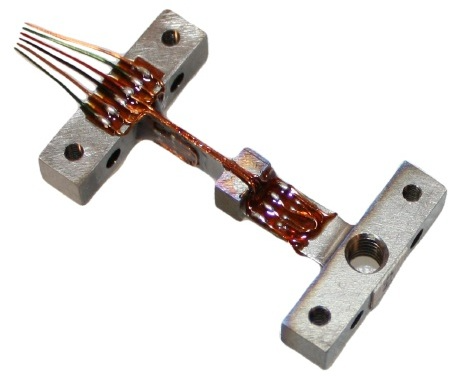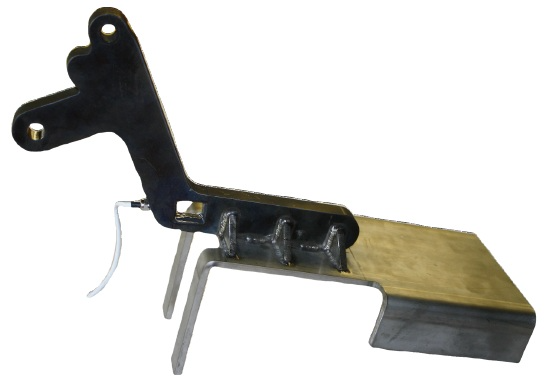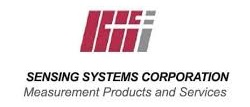A load cell is a device that converts a mechanical input, applied force, into an electrical signal whose magnitude is directly related to the amount of force being measured. Load cells are one of the most accurate, simplest tools for quantifying force.
Load cells are a vital piece of equipment that is utilized for measuring load and weight. This technology has been refined to be extremely accurate. Load cells calculate highly accurate, non-intrusive load measurement data.
Their accuracy is between 0.03 % - 0.25 % of the range being measured when they are properly calibrated. A number of manufacturers are choosing to use custom load cells as part of their equipment in order to take advantage of this accuracy.
Custom load cells or force transducers are designed to fit the product's specific requirements of shape, size, and measurement capacity. Custom load cells can also be manufactured to withstand challenging environmental requirements like vacuum in outer space, high or cryogenic temperature, underwater use, and high magnetic fields.
Why Use a Custom Load Cell?
There are many advantages of using a non-standard, or custom load cell. An existing part can be redesigned to operate as a load cell within existing equipment or as part of a test setup when cost, space, and performance are crucial.
The requirement which usually drives a fully custom sensor is to have zero change in overall system geometry. There is usually no change in width, height, or thickness of the original part when transforming an existing part into a force sensor.
The customer receives the force measurement at the precise location of interest by integrating sensing features directly into the part of interest. There are no losses to friction or misalignment, which can easily happen during assembly of an off the shelf load cell in line with the location of interest.
Furthermore, by using the fully custom load cell approach the overall complexity of the system can be greatly decreased. Extra mounting or alignment features can be kept to a minimum or be removed, leaving the part the same as before the added sensing features.

Custom Load Cell manufactured by Sensing Systems Corporation
The upfront time and effort required to design and manufacture a non-standard or fully custom load cell is not insignificant. Yet, more often than not, this approach will pay for itself with long term savings, given the lower assembly time and reduced number of parts.
For many requirements, the additional effort is worth the expense to acquire a precise and accurate measurement at an otherwise difficult or impossible location. The method of integrating a fully custom or non-standard load cell into an existing test setup or assembly has an infinite amount of applications.
The engineers at Sensing Systems have transformed a number of machine components into force or torque sensors. Everything is a possibility, from the simple – cylindrical rams in a press into load cells, to the complex – custom rotating propeller shafts into multi axis rotary force and torque sensors.
Applications of Custom Load Cells
Some examples of custom load cell applications include:
- Medical: Medical equipment frequently utilizes load cells for product validation, testing, and procedural testing. This can include something as advanced as three axis fingertip sensors in human controlled bionic arms.
Thanks to custom load cells, long term stent testing in saline solutions is possible. Patients can receive higher quality treatment and information when researchers gather accurate data from load cell measurements.
- Pharmaceutical: The process of manufacturing tablets requires numerous load measurements to properly compact and eject each tablet, in addition to increasing the efficiency of the tablet press. Highly customized load cells are employed to measure each step of the process.
- Automotive: Load cells can be utilized in the engine parts, suspension, valve calibration, and other features.
- Manufacturing: To accurately assemble products, automated manufacturing equipment often relies on accurate force measurement. Load cells are also needed in product testing, particularly when testing for product durability. These tools are also utilized when weighing products in batches for packaging.
- Agriculture: This load cell application includes the measurement and distribution of animal seeds, feed, and water. Many agricultural product providers automatically measure out large amounts of these products. Load cells ensure that every client receives the proper amount.
- Aerospace: Custom load cells can be used for everything from aircraft seats to rocket engines. Some aerospace components are needed to measure loads and weight on a near-continuous basis. These critical operations require high accuracy and intricate shapes, making custom cells often the best choice.

Image Credit: Sensing Systems Corporation
Where standard load cells cannot be utilized due to capacity, size, or environmental requirements, custom load cells make thousands of applications possible. Designers can incorporate sensing capabilities for monitoring and control by incorporating custom load cells and transducers.
A number of IoT products rely on custom load cell measurements to operate properly and communicate with larger control systems. Once a fully custom load cell has been designed, it must be integrated with the electronics acquiring the measurement signal.
Sensing Systems load cells all provide multiple signal output options – mV/V, digital, 0-5 or 0-10 VDC, and 4-20 mA. These output options can be matched to any instrumentation, PLC, or DAQ system.
Custom Load Cells from Sensing Systems
Sensing Systems has pioneered the specialized designs of “fully custom” or “non-standard” load cells and torque sensors and has customized sensor designs to meet customers’ requirements since its founding.

This information has been sourced, reviewed and adapted from materials provided by Sensing Systems Corporation.
For more information on this source, please visit Sensing Systems Corporation.